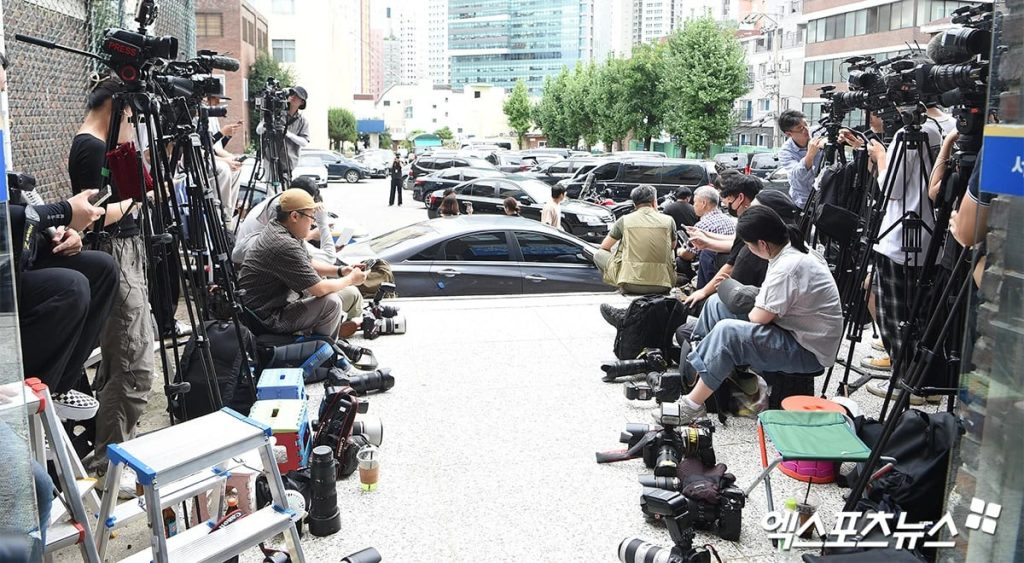
Chasing Clicks
In the digital age, transforming impressions into clicks is crucial for business growth and visibility. Not only do clicks drive traffic to your content, but they also lead to financial rewards through platforms like Google, for example. Beyond helping businesses, digital marketing also has the power to build celebrity, as we have seen it catapult public figures to worldwide fame almost overnight. However, this pursuit of a high click-through rate (CTR) has given rise to the phenomenon of “clickbait”: a tactic that involves creating sensational, misleading, or exaggerated headlines to drive page views.
With easy access to data on popular search terms, it has become simple to create optimized content to reach maximum engagement. While clickbait can effectively reach the intended audience, it becomes dangerous when it manipulates readers with distorted facts. Then, meaningful content becomes a tool for manipulation.
In South Korea, journalism faces a growing integrity challenge as algorithms increasingly determine the reach of news content. Fast-paced digital reporting to achieve high ranks in search results has led to a homogenization of coverage and a rise in public distrust toward korean media. As much as digital marketing can create a celebrity, it also holds the power to destroy them, which leaves public figures vulnerable to media manipulation.
Drunk “Driving”: The Case of SUGA from BTS

Suga or Agust D, one of the members of the globally renowned K-pop group BTS, is no stranger to being in the headlines. As part of BTS, the most-streamed group in Spotify’s history, he has been celebrated for the group’s countless achievements. However, one incident in June 2024 became a prime example of how kmedia can weaponize clickbait for financial gains.
On June 5th, the Korean rapper admitted to riding an electric scooter while intoxicated at a slow speed on the sidewalk. He thought that it was a safer alternative to driving a car after having consumed alcohol. Unaware that riding an electric scooter under the influence was also prohibited, he took full responsibility, apologized to his fans and bandmates, as well as paid the necessary fine.

In most cases, the story would have ended with consequences being paid, but for the Korean media, this was an opportunity to sensationalize the story for clicks. Over 200 articles per day were published with inflammatory clickbait headlines using keywords like “suga drunk driving,” “speeding,” and “highway.” These misleading terms created panic and spread unfounded rumours, such as claims that Suga could be expelled from BTS or even face up to five years in prison. It went as far as a video of a man speeding on a motorbike being aired on live TV, falsely claiming to be footage of Suga’s incident.
This intense pursuit of clicks by kmedia encouraged increased harassment of the artist, with hundreds of funeral wreaths being sent to his label, pressuring him to either leave the company or face more severe consequences.
From Online Clicks to Real-Life Irreversible Consequences

South Korea is a young country, not in age but as both an economic and cultural powerhouse. Just in 1961, it ranked amongst the poorest countries in the world. Today, it is amongst the top 15 of the richest world economies as its culture travels across the globe through music, fashion, entertainment, and sports.
Unlike gradual societal growth, “overnight” success can obscure the point at which things start to go wrong. South Korea, for all its achievements, is now grappling with a media landscape dominated by sensationalism, which in turn is having devastating effects on its citizens.
A notable example occurred just a year ago, when “Parasite” actor Lee Sun-kyun tragically took his own life. During an ongoing drug investigation, the actor claimed to have been tricked into consuming illegal substances, but the damage was already done. Kmedia outlets published 50 articles per day about him, amplifying the scandal for clicks and contributing to a public narrative that overshadowed his claims of innocence.
Media Manipulation Requires Regulation
Today, South Korea holds the highest suicide rate among developed nations, and media manipulation is a significant contributor to this troubling statistic. The relentless pursuit of clicks, often at the cost of truth and dignity, has resulted in real-life consequences, which emphasizes the pressing need for ethical standards and social responsibility to be promoted in the digital age. Without stronger education in media literacy and the regulation of algorithmic journalism, the consequences of clickbait culture will continue to take a devastating toll on individuals and society.
Sources
Carpena, M. (2022, August 29). What Is Clickbait and Is It Good or Bad? Web FX. https://www.webfx.com/blog/marketing/what-is-clickbait/
Folk, Z. (2023, December 27). Not Just Lee Sun-Kyun: Thousands Ensnared In Massive South Korean Drug Crackdown. Forbes. https://www.forbes.com/sites/zacharyfolk/2023/12/27/not-just-lee-sun-kyun-thousands-ensnared-in-massive-south-korean-drug-crackdown/
Kaufman, G. (2024, August 26). BTS’ Suga Apologizes Again to Fans Over Drunk Scootering Incident: ‘I Made a Grave Mistake’. Billboard. https://www.billboard.com/music/pop/bts-suga-apology-fans-army-drunk-scootering-incident-grave-mistake-1235760806/
Kim, M. (2023, March 4). The Perils of Algorithmic Journalism: How Clickbait and Fake News are Undermining Korean Journalism. LinkedIn. https://www.linkedin.com/pulse/perils-algorithmic-journalism-how-clickbait-fake-news-maru-kim/
Ross, M. (2023, December 27). Before his death, ‘Parasite’ actor Lee Sun-kyun lost work, faced intense police grilling amid South Korean drug crackdown. The Mercury News. https://www.mercurynews.com/2023/12/27/before-his-death-parasite-actor-lee-sun-kyun-lost-work-faced-intense-police-grilling-amid-south-korean-drug-crackdown/
Silver, C. (2024, October 4). The Top 25 Economies in the World. Investopedia. https://www.investopedia.com/insights/worlds-top-economies/#toc-11-russia

2 comments
Gloria
It’s a disgusting shame that the government allows the media to continue to bash celebrities into taking their own lives. BTS has added so much to the reputation, cultural experience and understanding around the world. Not to mention the financial growth of the country.
They should be treated as a national treasure. They should never have to be harassed and ridiculed in the media.
The media in South Korea is corrupt. Instead of building up people in the entertainment industry, they seem to thrive on making them and their family experience so much embarrassment and shame they end up taking their own lives.
I hate the South Korean media.
Diana Uhlman
Good article. Well researched, documented, summarizing fairly.